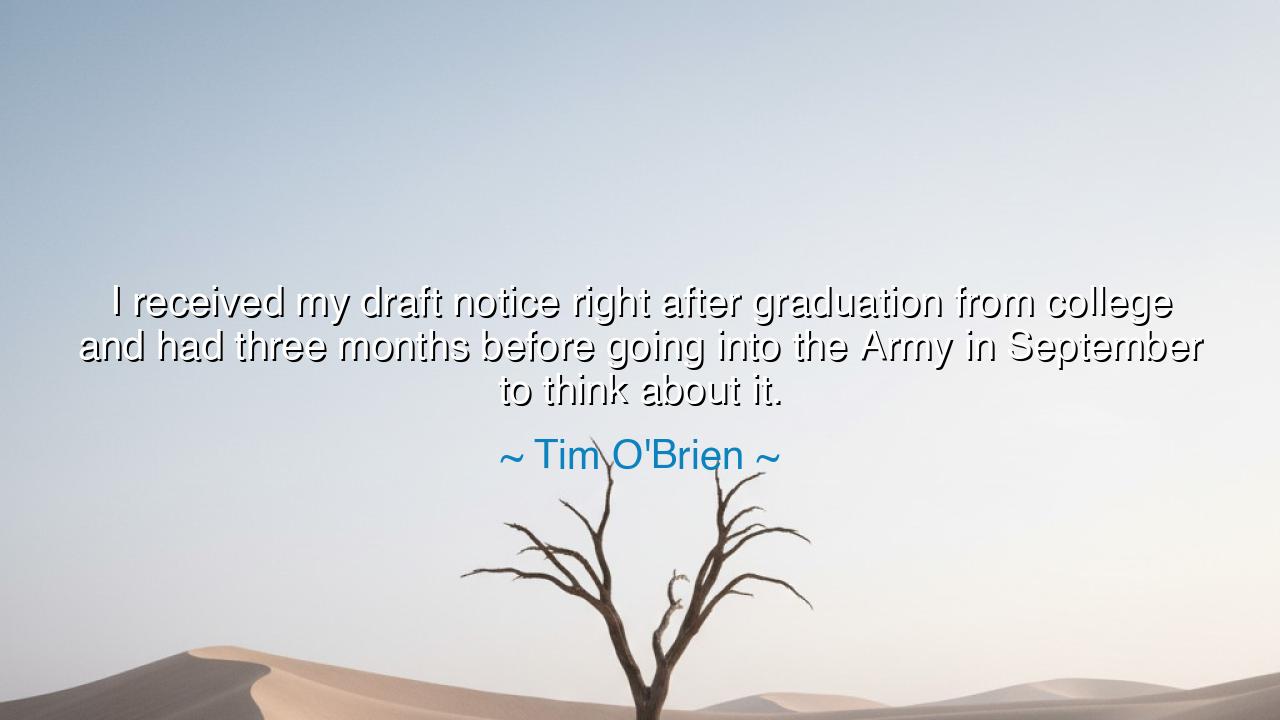
I received my draft notice right after graduation from college
I received my draft notice right after graduation from college and had three months before going into the Army in September to think about it.






In the solemn words, “I received my draft notice right after graduation from college and had three months before going into the Army in September to think about it,” Tim O’Brien captures the haunting stillness that comes before destiny overtakes choice. This is not merely the recollection of a young man called to war; it is the voice of a soul standing at the crossroads between innocence and duty, between the freedom of youth and the burden of conscience. Those three months of waiting — suspended between peace and violence, between the classroom and the battlefield — became, for O’Brien, the crucible in which his entire moral philosophy was forged.
The origin of this quote lies in O’Brien’s own life, long before he became one of America’s most celebrated authors of war literature. In 1968, he graduated from Macalester College in Minnesota — an idealistic young man who loved words, books, and ideas. He dreamed of graduate school, of writing, of a quiet life shaped by thought rather than blood. But that summer, the Vietnam War was raging, and the draft came for him. In a single envelope, the world he knew dissolved. His future — once limitless — was now confined to the green fatigues of the Army. In those three months, he wrestled with fear, morality, and identity. He would later write, in The Things They Carried, that “a true war story is never moral.” But this moment — the moment of being drafted — was the beginning of that truth.
The meaning of O’Brien’s reflection is layered and profound. To “think about it” was not a casual act; it was an existential reckoning. He was thinking about life and death, about the thin line that separates courage from cowardice, and about what it means to obey one’s country when one’s heart whispers no. Those three months were not idle; they were a meditation on what it means to be human in a world that demands obedience to forces larger than the self. In his stillness, he discovered that courage is not always in the fighting — sometimes it is in the thinking, the doubting, the refusing, or the yielding with eyes open.
In ancient times, men called to battle faced similar trials of conscience. Consider the story of Socrates, who, when summoned to serve in the Peloponnesian War, did not flee despite his philosophical disdain for violence. He believed that to live rightly, one must honor the laws of the city, even when they wound the heart. Yet later, when those same laws demanded that he renounce truth, he refused, accepting death instead. Socrates and O’Brien share this ancient dilemma — when duty and conscience diverge, the soul must decide which to serve. For O’Brien, the battlefield was not just in Vietnam; it was within himself.
Those three months before the Army became, in a sense, his apprenticeship in moral awareness. He would later turn that inner struggle into art, writing stories that exposed the hidden wounds of soldiers — not just the flesh torn by bullets, but the conscience torn by ambiguity. His words became a testament to the truth that war does not end when the guns fall silent. It lingers in the minds of those who must carry its weight. Thus, what began as a draft notice became a lifelong vocation — to bear witness, to remember, and to teach others how easily humanity can lose itself when obedience outpaces understanding.
There is also a quiet universality in O’Brien’s experience. Every person, at some point, receives a “draft notice” of a different kind — a summons to confront a duty they did not choose: a loss, a responsibility, a moment of truth that cannot be postponed. And like O’Brien, we are given a brief season to “think about it.” Those who use that time to reflect deeply, to face themselves honestly, often emerge wiser, gentler, and more awake to the gravity of life. Those who ignore the call may move forward, but without understanding — and understanding, not action alone, is what ennobles the human spirit.
The lesson of this quote, then, is not about war alone, but about conscious choice. Before life thrusts us into its battles — moral, emotional, or physical — we are given a moment to think. We must not waste it. Reflection is the armor of the soul; it is what turns blind obedience into meaningful action. O’Brien teaches that courage begins long before the battlefield — in the silence where one wrestles with one’s own heart.
And the practical action is this: when your own “draft notice” arrives — when life demands something of you that you fear or doubt — do not rush to act or to flee. Sit with it. Think deeply. Let wisdom temper instinct. Let conscience speak louder than fear. For in that sacred space of contemplation, between the letter received and the life chosen, you may discover what Tim O’Brien discovered: that while the body must go where it is sent, the soul remains free — and that freedom, once understood, becomes the truest form of courage.






AAdministratorAdministrator
Welcome, honored guests. Please leave a comment, we will respond soon